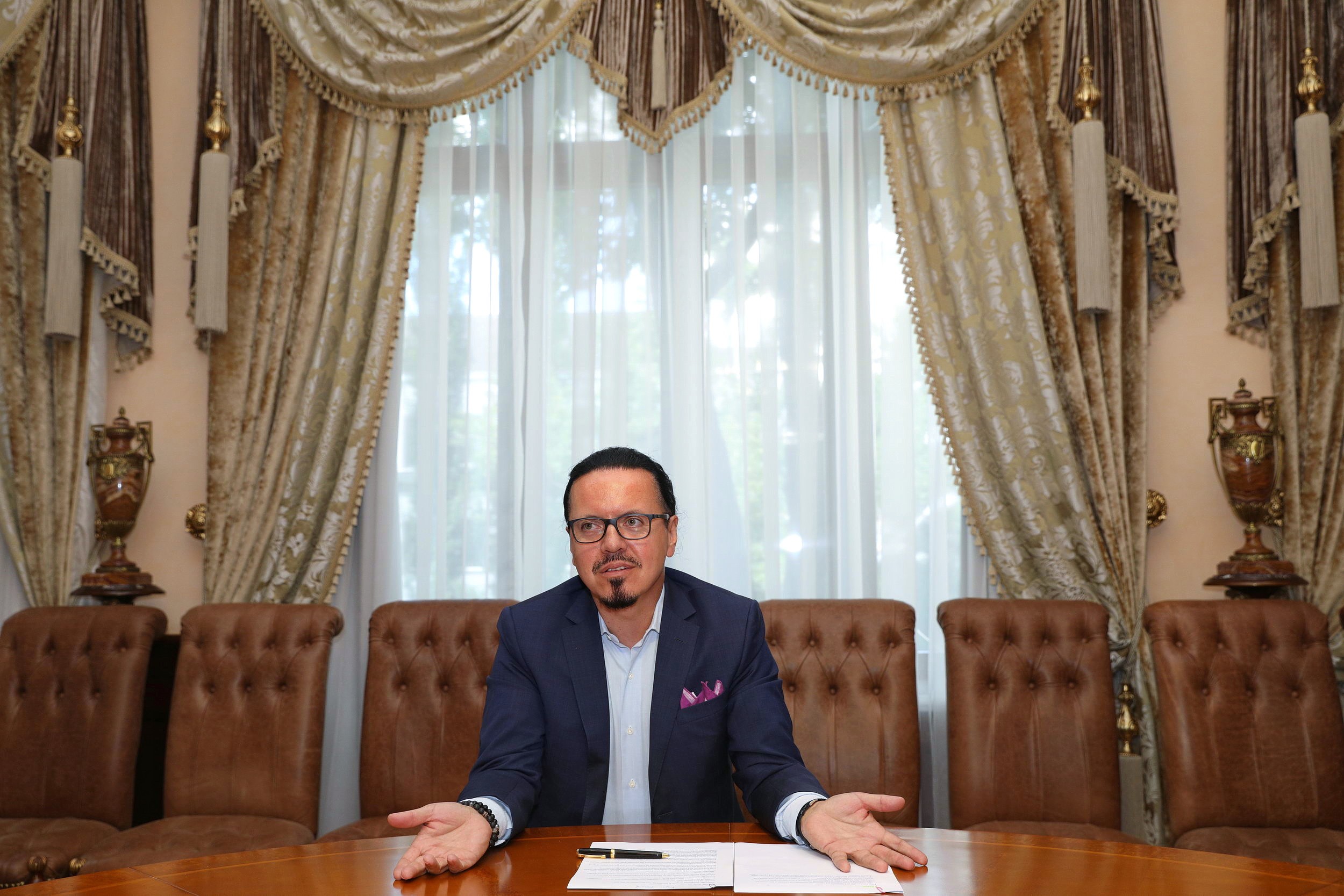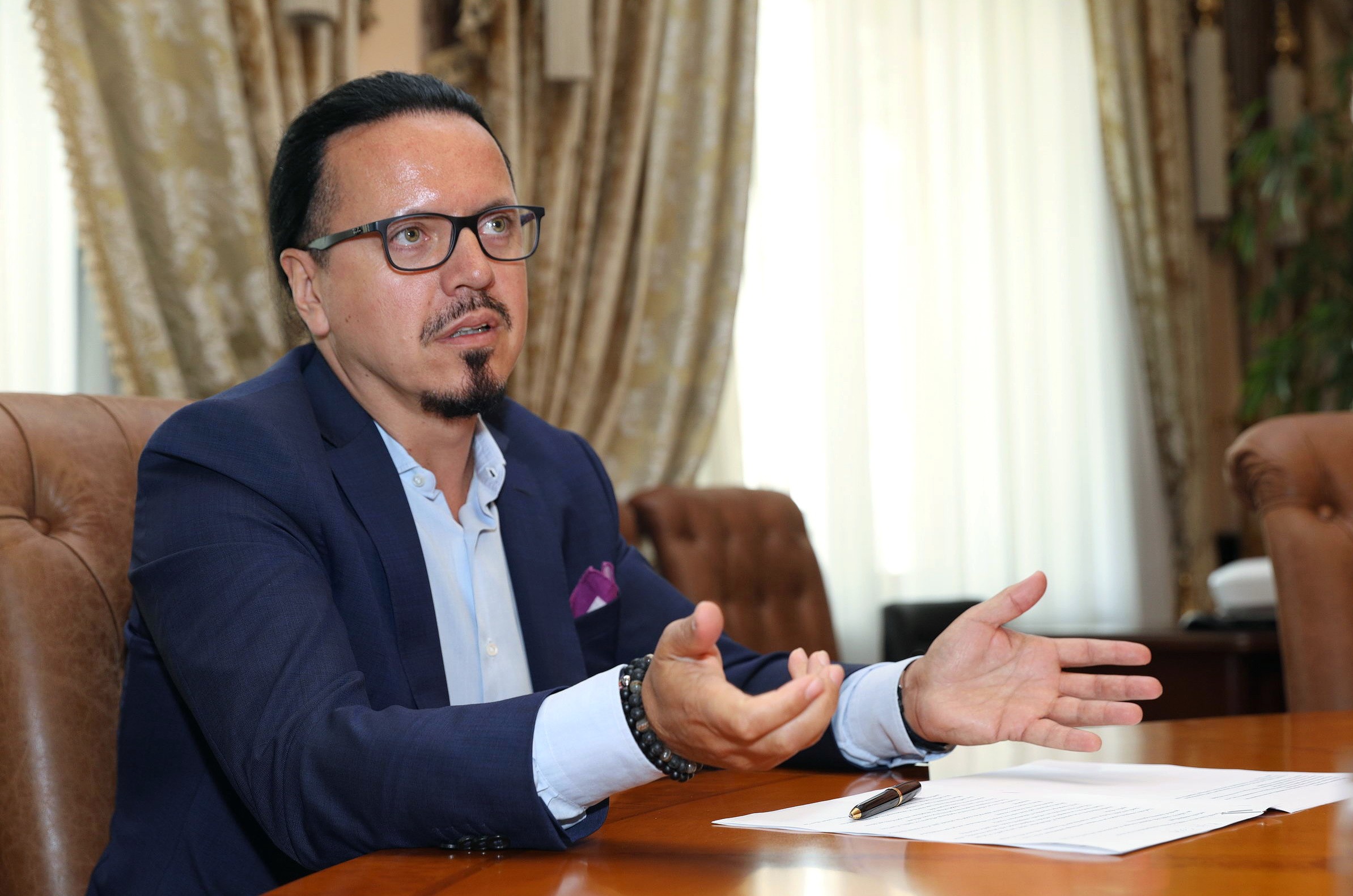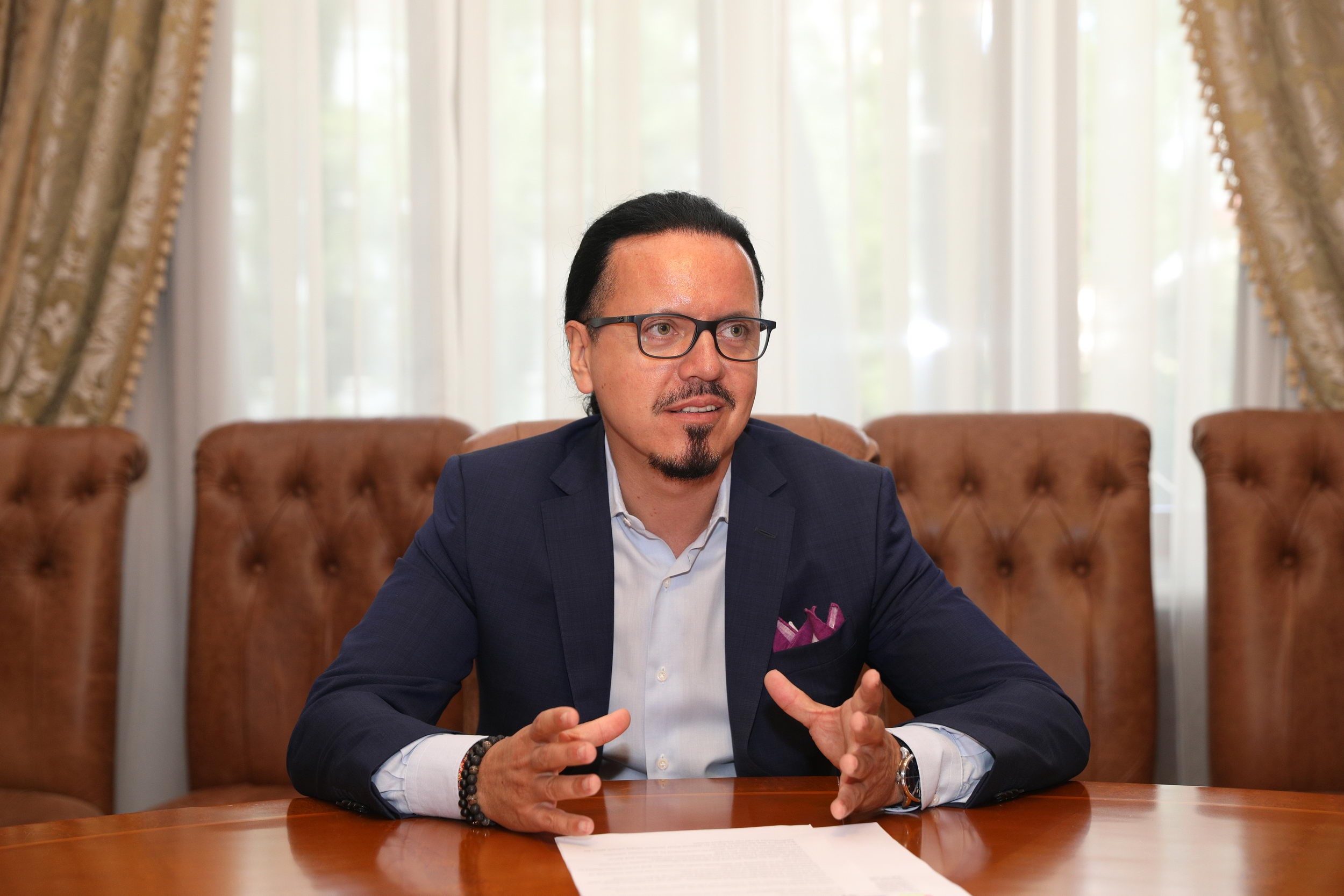Wojciech Balczun, the CEO of Ukrzaliznytsia, remains defiant despite heavy criticism from those who say the Polish rock guitarist has done little to improve the performance of the slow, inefficient and bloated state railways monopoly.
Although the one-year probationary period of Balczun, 47, came to an end on June 5, he wants to stay on the job and see through the “hundreds of initiatives” he has launched.
But his fate rests with Ukraine’s Cabinet of Ministers, which on Jan. 18 took control of Ukrzaliznytsia away from the Infrastructure Ministry and one of his biggest critics — Interior Minister Volodymyr Omelyan, who has accused the railways chief of “doing nothing.”
In his first interview with the Kyiv Post since becoming Ukrzaliznytsia CEO, Balczun said he is waiting for a “signal” from the authorities about his future in his $17,800 a month job.
“I want to stay. I have a bright vision of my future here, of what we want to achieve, what kind of goals we have on our list,” Balczun said on July 5.
Balczun says he has been unfairly judged by Omelyan and other critics.
“It’s an uncomfortable situation for both of us. I wouldn’t call it a conflict,” he told the Kyiv Post. “It began a month and a half after I took up my position. And here is my answer: you can’t pass judgment on anything in a month and a half, not my skills, my qualifications, my experience, or my results. It’s too early.”
Balczun believes he faces opposition because he is independent. He says he strives to remain above business and political forces who seek to use Ukrzaliznytsia for their own interests.
If true, such a stance could cost him his job.
“I would like to continue my mission so as to see fully the results of what has already been done, of what has been started here by my team and me,” he said. “Ukrzaliznytsia is at the very epicenter of the games and the bargaining between political forces and between the political-business groupings which exist in Ukraine.”
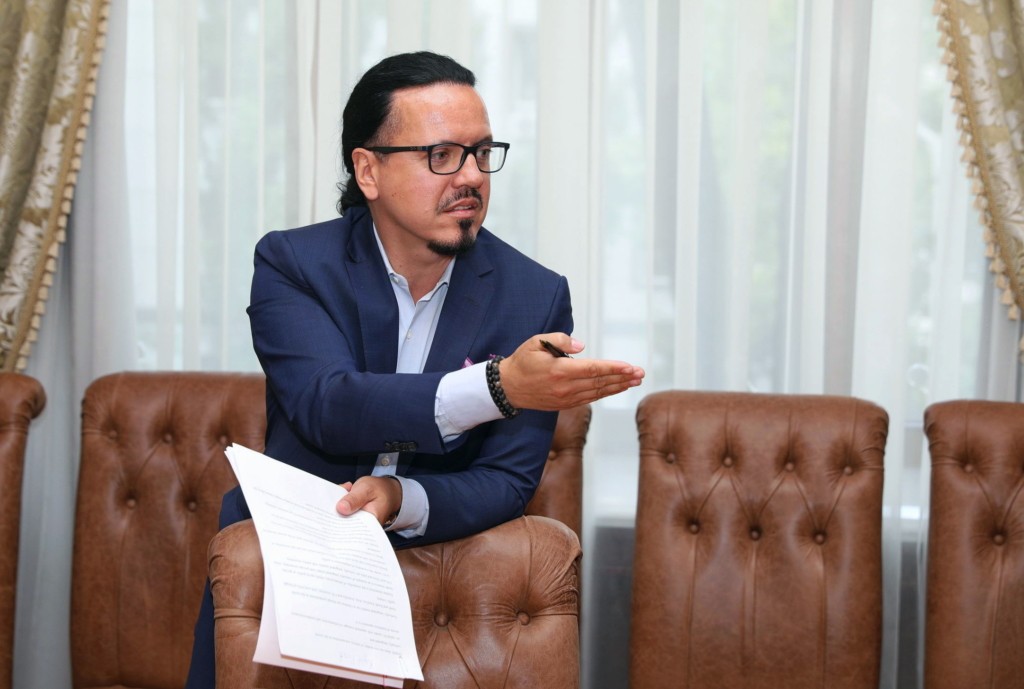
Balczun says he can’t fire all the corrupt managers at Ukrzaliznytsia because he would not be able to find enough people to replace them. (Volodymyr Petrov)
Corruption, mass theft
Vested interests, says Balczun — that’s as close as he would come to naming the corrupt obstructionists — have played a huge role in thwarting his attempts to reshape the state enterprise.Corruption has found its way into more or less “everything.” Graft still continues today and the scale of it is so large that the CEO says if he were to spend all his time trying to fight it, there would be no time left for “real reforms.”
Corruption has found its way into more or less “everything.” Graft still continues today and the scale of it is so large that the CEO says if he were to spend all his time trying to fight it, there would be no time left for “real reforms.”
“Most of the structures here were created and maintained solely in order to create opportunities to siphon money out of the company,” he said.
Balczun and his team say they are fighting against corrupt schemes in procurement which force Ukrzaliznytsia to pay excessive amounts for fuel and spare parts.
Tenders, meanwhile, are often blocked by “front” firms. Balczun named Maksmed International as one such business, saying that it had been responsible for blocking 60 Ukrzaliznytsia tenders. He says he doesn’t know who is behind the company.
Maksmed International did not respond to a Kyiv Post request for comment.
The Polish CEO says the Ukrainian legal environment is still favorable to the corrupt and that although initiatives like ProZorro have helped increase transparency, even it is open to abuse.
Meanwhile, personnel within Ukrzaliznytsia also remains a source of graft, with theft perpetrated on a wide scale. Balczun said that those who should be fighting such practices are often “guarding them instead.”
But replacing management suspected of complicity in wrongdoing is far from straightforward. Dismissing subordinates, he argues, would leave him with no one to fill the vacated positions. Bringing people in from abroad is not an option.
“I can’t bring in thousands of managers from the West,” Balczun told the Kyiv Post.
“It’s not only because of money: Ukraine is considered a country with a high level of risk and there are no guarantees that the people who come will be able to understand the system which has been created here over the decades.”
Balczun says what he aims for is not to replace staff but to remove opportunities for corruption through structural changes and gradually hiring people he can trust.
“I make my decisions and when I appoint people I do so with good intentions,” he said. “But sometimes I make mistakes. And I feel like a soldier in a minefield — every decision can be fatal in Ukraine.”
The CEO told the Kyiv Post that he intends to hire a forensic audit team to clean up graft at “every level” of Ukrzaliznytsia, a step which he described as being “unprecedented” in Ukraine.
Big cuts, big plans
Ukrzaliznytsia employees face an uncertain future because the CEO is planning to make significant cuts to the monopolist’s bloated 300,000-strong workforce. He thinks he can achieve reductions with cash incentives to encourage voluntary resignations. He is hopeful for a compromise with labor unions.
But the Railworkers Association in Ukraine told the Kyiv Post on June 2 that it has signed a memorandum of understanding with Balczun that there will be no mass layoffs.
Far from cuts, the union wants Ukrzaliznytsia to add another 50,000 people to run properly.
But Balczun has a different view.
As the head of Polish State Railways from 2008 to 2013, he reduced staff by 50 percent over a three-year period. He describes the cuts as one of his “biggest successes” in increasing the enterprise’s efficiency, and believes the same could be done at Ukrzaliznytsia. A smaller workforce would result in higher salaries. The average worker at the rail monopolist makes only $269 per month.Apart from personnel, the rail chief has big ideas when it comes to revamping Ukrzaliznytsia.
Apart from personnel, the rail chief has big ideas when it comes to revamping Ukrzaliznytsia.
He says he is ready to embark on the biggest procurement of locomotives in history of the enterprise and is in the United States this week with a delegation of five top managers for talks with some of the world’s leading producers, including GE, Greenbrier and Amsted Rail.
He says he hopes to establish joint ventures but will not allow them to fully realize their hopes of entering Ukraine’s rail freight market as competitors.
Balczun told the Kyiv Post he sees international firms as one source of investment Ukrzaliznytsia desperately needs. He is also hoping to secure financing on favorable terms from Ukrainian banks and international lenders like the European Bank of Reconstruction and Development.
Above all he wants the monopolist to be able to fund itself through positive cash flow. That state of affairs is some way off, with an audit carried out by E&Y showing that Ukrzaliznytsia lost $280 million in 2016. The figure was, however, half of the loss of the previous year.
The latest financial results provided by the state enterprise show it made a profit of $4 million in the first five months of 2017, a significant improvement over the $142 million loss it made over the same period in 2016.
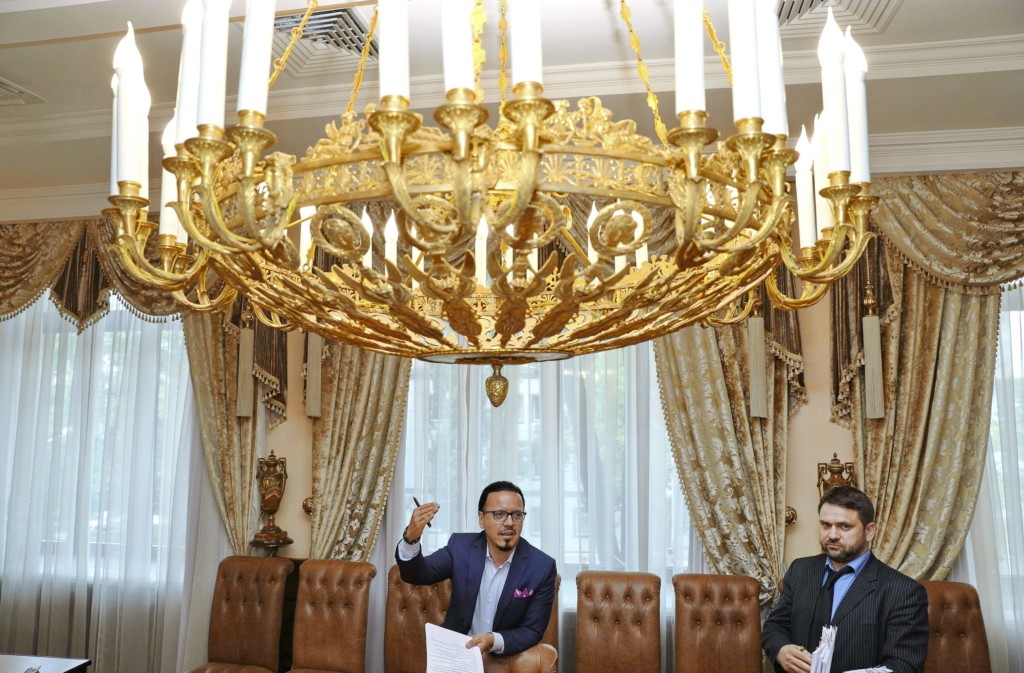
Ukzaliznytsia CEO Wojciech Balczun (L) and Chief Financial Officer Andriy Ryazantsev (R) speak to the Kyiv Post on July 5. The state enterprise recorded a $280 million loss in 2016 although that was a significant improvement over the previous year’s results. (Volodymyr Petrov)
Black PR
Balczun argues that such improvements in Ukrzaliznytsia’s financial results are a testament to the quality of his leadership. And this, he says, is only the beginning. Now that the groundwork has been laid, given the chance to stay at the helm of the rail operator, he would be able to make further progress.
But he wants to be given time and space.
“These big, spectacular things that are expected from me will be done, but in the right way,” he told the Kyiv Post.
Meanwhile, amid the uncertainty over his future, Balczun claims he has been the victim of a “black” PR campaign.
His position as the frontman in a rock band has been a particular target for criticism, leading him to suggest that a small “mental revolution” is needed in Ukraine so that he receives the same treatment as public figures who are left alone to enjoy more “conventional” hobbies like fishing and running marathons.
Still, Balczun says he is determined to remain CEO at Ukrzaliznytsia, not only to make the essential changes, but to protect his reputation as well.
“If I leave now and don’t continue working until the company shows concrete results, I’ll be in the position of a person who has done all the dirty work but gets labeled as the one who didn’t succeed,” he said. “This poses a personal risk to my reputation in Poland and all over Europe.”
